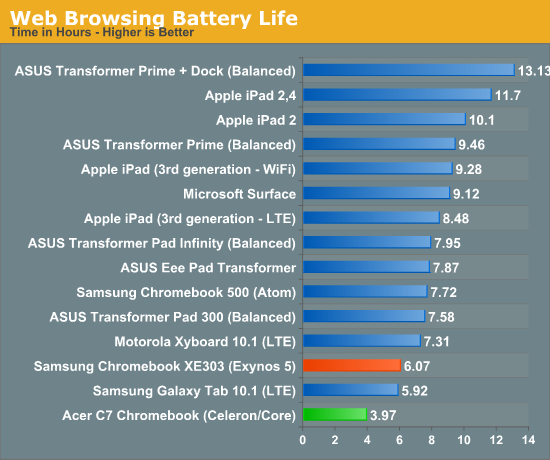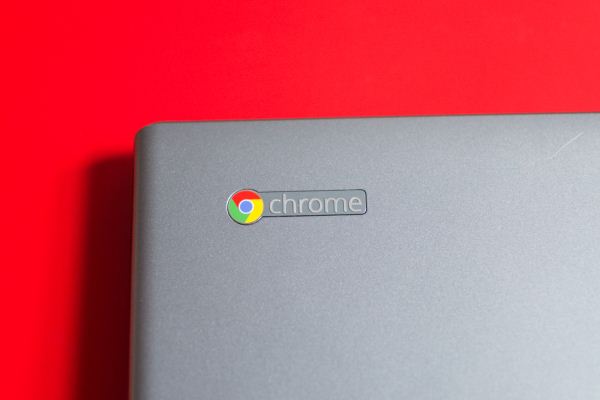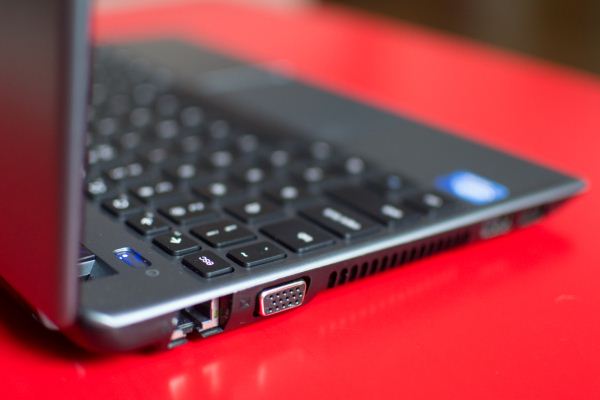Acer C7 Chromebook Review
by Jason Inofuentes on January 21, 2013 12:30 PM ESTBattery Life
If the point of Chrome OS is for you to live in the browser, then the clear choice for testing battery life is our updated Web Browsing battery life test. Here we find that the advertised figure of 4 hours is almost spot on. While it’s nice to see some accuracy in these battery life claims, that’s no salve for the fact that this isn’t a road warrior. This is the lowest common denominator for getting into a Chromebook, but if it can only be untethered for four hours, that doesn’t make this the most mobile device.

Conclusion
I wanted to really dislike this experience, and in many ways it was compromised. But much of that is just a matter of having to live in the browser. Right now, on my MBP I have three browser windows with around two dozen tabs open. I have VLC open for playing some videos while I work, OpenOffice for reading documents that don't get along with Google Docs or TextEdit, Lightroom, Twitter, Scrivener about a dozen TextEdit windows, and Spotify. Now, all of those things can be emulated in a browser window. But local file playback isn't nearly as fulfilling, with any of those solutions, and manipulating large files in the cloud can be a huge hassle. If you can fit your workload inside a browser window, Chrome OS can be great. If you're working with lots of images, lots of larger files, have a penchant for working on a dozen things at a time, then Chrome OS might not stand up to your needs.
So that’s the bad, here’s the good. This thing really does cost just $199. Anand talked about how the $249 price for the ARM-based Samsung Chromebook gave it an almost disposable quality and allowed it to get away with many sins and still be likable for it’s purpose. Here the added power and lower price just emphasize that point. If you need a focused writing device, you certainly couldn’t get more for your money than this. And the hardware you’re paying for isn’t without its merits. The Sandy Bridge cores are good performers, even at 800 MHz, and though the limited RAM and mechanical storage aren’t inspiring, they’re also easily replaceable. As, indeed, is the OS. We’re hoping to explore the possibilities further, but Ubuntu is a real possibility on Chromebooks, as are other Linux builds. So buyers interested in a more full-featured laptop can get their wish with just a few strokes of the keys.
It’s odd to sing a device's praises for what can be done with it, outside it’s intended purpose. We don’t judge a cellphone or tablet based on what wild software and hardware can be hacked upon it. We judge these things based on out of the box performance and features. But then, the PC space has always been for tinkerers. If you can’t fiddle with its innards, something is taken away from the experience. And as the PC space moves further and further down the trail blazed by smartphones and tablets, as users have fewer and fewer opportunities to upgrade their devices, it’s always nice to see a device move the other way.
The Acer C7 Chromebook is the fastest iteration of Chrome OS we’ve seen so far, and is priced so low as to make it the first real impulse buy in the laptop market. Low prices come with compromises, and there are real compromises to all of the Chromebooks. The Samsung Chromebook is nicer to on the eyes and fingers, but slower and pricier. The Acer C7 isn't the total package, but it's pretty good, and definitely worth a shot.












63 Comments
View All Comments
Spoelie - Tuesday, January 22, 2013 - link
mhz doesn't matter, it's just a function of architecture on a given process node.With the celeron, you get 15% better cpu performance for 65% of the battery life, which is a pretty lousy showing imo.
On the other hand, at least the GPU is an improvement.
madmilk - Wednesday, January 23, 2013 - link
MHz does matter. Sandy Bridge is not optimized to actively run at 800MHz - its sweet spot is around 3GHz. You pay a huge perf/watt penalty through leakage. An i7 doing the same tasks can go to sleep and power gate in 1/4 the time.BedfordTim - Monday, January 21, 2013 - link
Agreed. I was surprised how close the A15 was. Given the level of development that has gone into x86 processors, you would expect the code to be faster, and the gap should close with time.silverblue - Tuesday, January 22, 2013 - link
I think it could be the case that making an architectural change yields significant benefits, however after you while you'd end up like Intel, spending a huge amount of money to eke out a few more percent. I doubt that the next big step for ARM would be anything like A9 to A15 was.andrewaggb - Tuesday, January 22, 2013 - link
I know when I saw the benchmarks I had to go back and look at the x86 specs. For a second I thought the A15 was way faster than I expected. But then I saw just how crippled the celeron is and everything made sense...JasonInofuentes - Monday, January 21, 2013 - link
Others pointed this out, but the take away from performance a performance standpoint is that if you take the second fastest x86 core designs in the market today, gut them, take out their legs, wrap a chain around their neck and put blinders on them, they're still faster than the fastest ARM Cortex-based SoC on the market today.The big play with A15 is that they have finally reached IPC parity with small notebooks. And while that would have definitely been true 5 years ago when Atom was still fresh and Sandy Bridge was off the edge of Intel's road map slides, it is now not nearly so strong a case. In terms of performance/watt, ARM has done a very very good thing and they should be commended for that. And I have no doubt that a Chromebook equipped with Exynos 5 clocked at 2.3GHz would wipe the floor with the Acer C7. But we're still talking about putting a featherweight champion against a heavyweight punching bag.
We'll explore this relationship a little further, indeed you can get some feel of it in Anand's reviews of the Win8 tablets that have been coming out. Stay tuned.
lmcd - Saturday, January 26, 2013 - link
Hmm, but the graphics are an important point, and it seems like ARM (Mali-series) and Nvidia have a better roadmap there. Maybe a T4 Chromebook could take down an Ivy or Haswell ULP? Or an Exynos-Quad?Worth seeing.
bleh0 - Monday, January 21, 2013 - link
I'll wait till there is a reliable way to put Mint 14 on it. Until then you might as well put money towards the Samsung chromebook.mutatio - Monday, January 21, 2013 - link
Never mind the fact that this product, in similar fashion to the Droid phones, is designed entirely with the focus of mining, harvesting, and exploiting your personal data for their profit. No thank you, Google. Hell, I'll pay the Dell/HP "premium" of a $299 or $399 laptop/ultrabook to avoid that whole arrangement. Mind you, I've already happily paid the Apple premium to have devices focused on my ease of using them rather than the ease of which my information is exploited. Apple has a much better track record in respecting user's privacy, making the disclosure of it voluntary rather than inherent to the products being used.phillyry - Monday, January 21, 2013 - link
That's a good point.It really does seem like Google's dark side is starting to show now that they've got a death grip on the market.
It's like, "Mawahaha, now that we've got you in, we'll just monitor and monetize every aspect of your virtual life. Hahaha!"